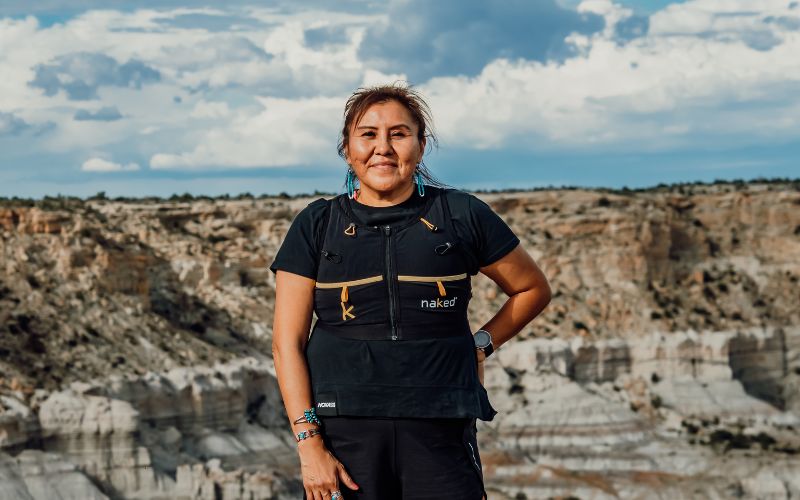
- Details
- By Kaili Berg
From just starting to run in her 30s to building an entire running organization that is going to compete in the TCS New York City Marathon this week, Verna Volker (Diné,) looks back on the growth of Native Women Running with great pride.
“I was athletic, but I never took up running when I was younger,” said Volker, who created Native Women Running, an organization that strives to increase Indigenous visibility in the running world. “I was taking care of everyone but myself when I got older, and that's when I took on running, and I got hooked.”
For Volker, the sport is less about competition and more about healing and resiliency. Volker has lost her parents and three of her sibling, and she dedicates her runs to them to inspire and motivate her along the way.
“I always think about my parents who never had these opportunities,” Volker told Native News Online. “That has been my motivation and inspiration for what they went through for me to be here today. I carry that in races and tuck it into my heart and mind when things get thought out there.”
The idea for starting an Indigenous running organization was to highlight Native American women runners through social media and share their stories through Instagram.
“I was frustrated from not seeing people like me in the running space,” Volker said. “I did research, and I remember seeing only one Native runner, and I questioned why there are not more people represented in this space. I then created an Instagram account and told people to follow it and it just exploded from there.”
Native Women Running has since grown an organic following of more than 30,000 on Instagram, where the vision is to encourage and feature Native women runners in the running community on and off the reservation.
“I share stories of our Native runners, specifically our Native sisters because Native stories are very important. I do my best to highlight our Native women all across the United States and Canada and simply give them a platform.”
Native Women Running seeks to increase Indigenous representation in a sport that lacks diversity. According to a study from the Running Industry Diversity Coalition, 96% of running owners and organizational leaders are white.
Over the last few years, Native Women Running has become a company where as a founder, Volker can break down barriers to travel to running events through sponsorships. So far, the organization has created more than 30 teams and supported more than 130 runners.
“It's been really amazing to see how this has brought so much positivity and empowerment to our Native women and also a place where they have become friends and started a sisterhood.”
This week, eight Native Women Running participants will compete at the TCS New York City Marathon on Sunday, November 5. Angel Tadytin (Navajo/Dine), Mika Shaw (Navajo/Dine), Adaline Lacy Tsingine (Navajo/Dine) Marilinda Franciso (Tohono O'odham Nation), Zelda Elijah (Iroquois) Lace Coughlin (Mohawk), Jocelyn Mcintosh (Metis), and Verna Volker will be pushing themselves as far as 26.6 miles.
Considering Native Women Running’s respected beginnings, Volker has created an organization that is prepared and eager to make a statement in a big way against the best the sport has to offer this week.
“We want to share our perspective on running, and we want to be seen in this space. To be at the New York Marathon is huge, and I am so excited to bring along these Native sisters along this journey.”
More Stories Like This
Chickasaw Holiday Art Market Returns to Sulphur on Dec. 6Center for Native Futures Hosts Third Mound Summit on Contemporary Native Arts
Filmmakers Defend ‘You’re No Indian’ After Demand to Halt Screenings
A Native American Heritage Month Playlist You Can Listen to All Year Long
11 Native Actors You Should Know
Help us defend tribal sovereignty.
At Native News Online, our mission is rooted in telling the stories that strengthen sovereignty and uplift Indigenous voices — not just at year’s end, but every single day.
Because of your generosity last year, we were able to keep our reporters on the ground in tribal communities, at national gatherings and in the halls of Congress — covering the issues that matter most to Indian Country: sovereignty, culture, education, health and economic opportunity.
That support sustained us through a tough year in 2025. Now, as we look to the year ahead, we need your help right now to ensure warrior journalism remains strong — reporting that defends tribal sovereignty, amplifies Native truth, and holds power accountable.
 The stakes couldn't be higher. Your support keeps Native voices heard, Native stories told and Native sovereignty defended.
The stakes couldn't be higher. Your support keeps Native voices heard, Native stories told and Native sovereignty defended.
Stand with Warrior Journalism today.
Levi Rickert (Potawatomi), Editor & Publisher


